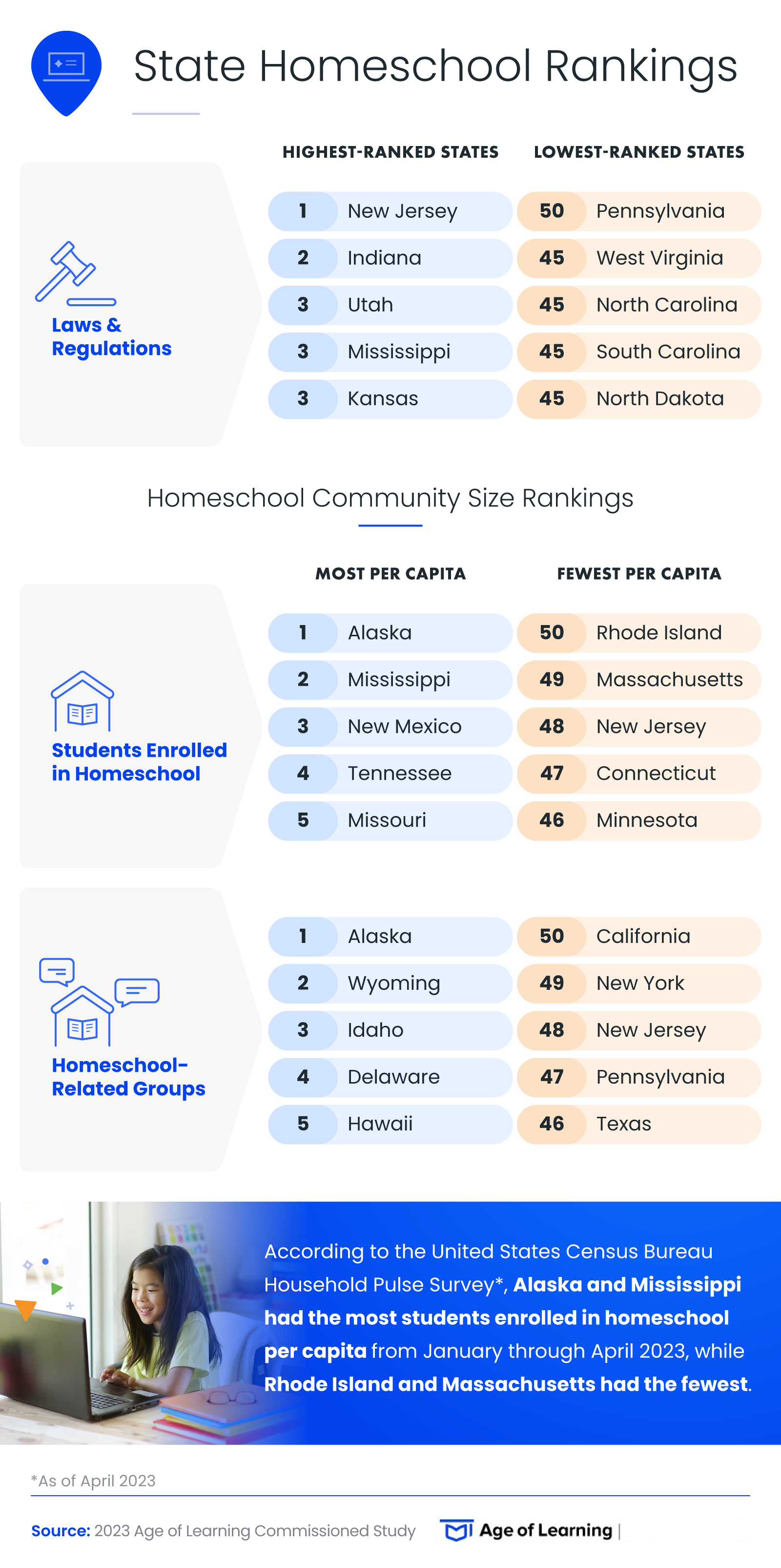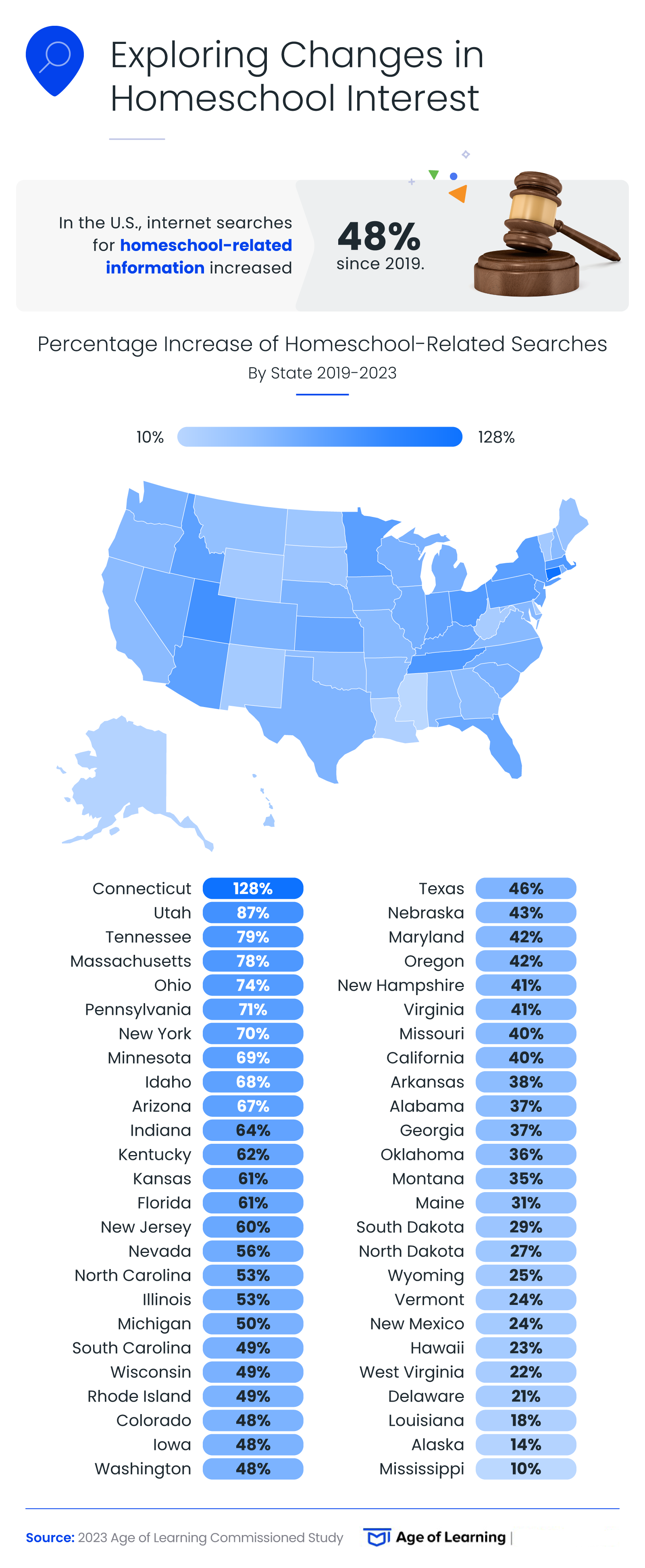
Discover the Best States for Homeschooling
If you use ABCmouse for homeschooling, you may curious to know which states are considered the best for homeschoolers. See if your state made the list!
Key Takeaways
- Indiana and Idaho are the best states for homeschooling in the U.S.
- New Jersey is the least regulated state for homeschooling.
- Alaska has the most students enrolled in homeschool per capita in the U.S. in 2023.
- In the U.S., interest in homeschooling has increased by 48% since 2019.
- Homeschooling interest in Connecticut has increased by 128% since 2019, the biggest increase among U.S. states.
Empowering Education at Home
Interest in homeschooling is on the rise, leading many states to adopt homeschool-friendly practices and policies. But with varying laws and procedures in each state, it can be tricky for home educators to plan curricula, find outside support programs, and access state-run activities.
To help home educators navigate the state homeschool landscape, Age of Learning commissioned a study on homeschooling support, interest, and policies across the U.S. This article will explore those findings and determine the best states for homeschooling based on five categories. How well will your state rank? Let’s find out.
Homeschooling in All 50 States
Home educators need various types of support from state sources, from freedom of instruction and curriculum choice to access to student athletics and extracurricular activities. The commissioned study looked at homeschooling support within five categories and ranked all 50 states based on the results.

After analyzing the rankings, Indiana and Idaho shared the top spot for the best U.S. state for homeschooling. Indiana had the least restrictive homeschooling options and some of the most supportive laws and regulations, allowing home educators to teach what they want using whatever methods best reach their students. Idaho also had the least restrictive homeschooling options but has a few more homeschooling laws and regulations. Both Indiana and Idaho provided easy access to student sports and extracurriculars. Utah, Arkansas, and Alaska rounded out the top five best states for homeschooling.
Thriving or Striving
To further understand the overall rankings, let’s take a closer look at the categories used to evaluate home education in each state.

State laws and regulations have the most significant impact on home educator freedom and homeschool student support. New Jersey was the least regulated state for homeschooling, followed by Indiana and Utah. All three states try to impose as few regulations on homeschooling as possible while also enacting laws that support home educators and students, including current or proposed tax credits for home education expenses. Conversely, Pennsylvania, West Virginia, and North and South Carolina enforce the most home education laws and regulations.
Many homeschool students rely on access to state-sponsored extracurriculars in order to participate in afterschool sports, theater, and other activities. But some states require public school enrollment for participation in state-sponsored activities. California, Alabama, and Delaware were among the most prohibitive states for extracurriculars. Fortunately, most states aren’t so restrictive, and there was a 31-way tie for the state with the easiest access.
Beyond extracurricular activities, homeschooling families often seek a strong home education community. Alaska had the biggest homeschooling community in the country, with the most students enrolled in homeschool per capita in 2023 and the most homeschool-related groups. Following Alaska, Mississippi and New Mexico had the most students enrolled in homeschool per capita, and Wyoming, Idaho, and Delaware had the most groups per capita. On the low end, finding a homeschool community in Rhode Island or California might be more difficult, as they had the fewest homeschool students and homeschool-related groups per capita, respectively.
Homeschooling on the Rise
Digital innovation in education has made homeschooling resources more widely available. How has this ease of access impacted interest in homeschooling? The Age of Learning commissioned study looked at Google search trends for homeschool-related information to see how interest in home education has changed since 2019.

More and more families nationwide are turning to home education. Searches in the U.S. for homeschool-related information increased by 48% since 2019, with Connecticut seeing the largest increase at 128%. Utah saw the second biggest boost at 87%, followed by Tennessee (79%) and Massachusetts (78%).
Even among states with lower increases in search volume, other evidence suggests high interest in homeschooling. Mississippi (10%) and Alaska (14%) saw the smallest growth in homeschool-related searches, but the two states have the highest homeschool population per capita, so interest was already exceptionally high. Meanwhile, residents in other states may not be searching due to circumstances rather than a lack of interest. Delaware (21%) and West Virginia (22%) had low rates of interest but are home to some of the most stringent homeschooling restrictions in the nation.
Legislative Landscape
As interest in home education continues to grow, state governments are busy drafting legislation that will affect homeschoolers in the future. Let’s look at some pending bills likely to influence home education.

As of 2023, 14 states had pending legislation that may affect home education. While bills can change significantly from introduction to adoption, all but one of the proposed bills is poised to impact homeschooling positively. New York’s Bill A226 would introduce yearly procedures and strict approval processes for home educators.
Unlike New York, West Virginia hopes to make things easier for home educators. The state had the most pending legislation concerning homeschoolers, with five separate bills in process. West Virginia’s HB3117 would remove assessments for homeschoolers, and HB3048 would remove mandatory homeschool reporting.
Other legislation of note were New Jersey’s A3304 and Ohio’s SB11 Parent Educational Freedom Act, both of which would provide more tax credits for homeschooling expenses. Other proposed bills would open scholarship opportunities to homeschooling students.
Beyond the Classroom
Whatever the laws and regulations in your state may be, a great home education is possible with the right tools. And with interest in homeschooling increasing across the country, resources and communities will likely grow and become even more accessible. Armed with a growing community, positive legislation, and the rapid advancement of technology, the power to change your child’s educational path is in your hands.
Methodology
For this campaign, our commissioned study compared the 50 states across the following factors:
- Homeschooling laws and regulations (60 points)
- Restrictiveness of options for homeschooling (10 points)
- Number of students enrolled in homeschool per capita (10 points)
- Number of homeschool-related groups per capita (10 points)
- Access to state sports and extracurriculars (10 points)
The factor, “homeschooling laws and regulations” was evaluated using six relevant metrics, which are listed below with their corresponding weights. Each metric was graded on a 100-point scale, with a high score representing the least regulated states for homeschooling.
- Burdensome nature of assessments or evaluation requirements (25 points)
- Requirement and stringency of home educator qualifications (25 points)
- Burdensome nature of notice of intent (12.5 points)
- Burdensome nature of record keeping requirements (12.5 points)
- State-mandated subjects required (12.5 points)
- State resources and/or finances available (12.5 points)
For the factor “Restrictiveness of Homeschooling Options,” the meaning of the labels is as follows:
- No restrictions: States with no regulations regarding homeschooling options.
- Low restrictions: States with low regulated options for homeschooling.
- Moderate restrictions: States where some of their homeschooling options are highly restrictive while others have low regulations.
- High restrictions: States where all homeschooling options are highly regulated.
This study used data from the Household Pulse Survey conducted by the United States Census Bureau to determine the number of students homeschooled per capita, as well as Google Trends data from 2019 and 2023 to analyze search volume data for interest in homeschooling across all 50 states.
It also used https://legiscan.com/ to analyze pending legislation related to homeschooling in each state.
About ABCmouse
ABCmouse supports teachers and parents in enhancing children’s learning. With research-backed learning program created by curriculum experts, our app features over 850 lessons and 10,000 activities designed to grow literacy and math skills for children ages 2-8. Check Out ABCmouse ➜
Fair Use Statement
Want to share these findings with your homeschool community? We encourage you to share this information for noncommercial purposes only; you must provide a link back to this page so readers can access our full findings and methodology.
